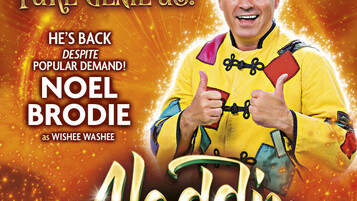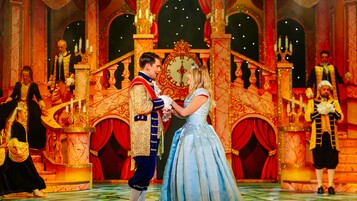News Story
As panto season is underway, it’s always exciting to see which big name shows and timeless classics are coming to your favourite theatre. Panto fans often try and see as many shows as possible, but what makes a really good pantomime? How would you go about writing your own and creating a fantastic script that just works? Below we’re delving into the essentials for writing a sure-fire panto hit.
Remember audience expectations
When going to see a panto, the audience already knows the ins and outs of the story, they’re usually well-known classics and fairytales, so while you can and should make some adaptations and changes, don’t stray too far. The basic structure of the panto should be adhered to as well as the general plot of the original story. Audiences expect to see essential features such as the Dame's opening speech, the ghost gag, and the song sheet.
Keep the story in mind
A lot of what makes panto so popular is the comic humour and mayhem that takes place. However, the plot of the story still needs to be threaded through. Pantomimes should be funny and entertaining and the main story, whether that’s Cinderella or Aladdin, should remain at the heart of the show.
Structure with care
Keeping it simple is effective and structuring your panto should be kept straightforward and easy. Split the panto story into two halves, each with their own crisis. The second crisis is usually an exaggerated development of the first. The first half of the show should end with action or resolution for the first crisis but also signs of what the next crisis might be. The second half of the show should be brief, fast, and packed with drama and action, ending with a suitable resolution to the second crisis.
Create space for showing off (within reason)
If you want to give your performers the chance to express themselves then unique songs written just for them always go down a treat. Similarly, improvisation should be accounted for. Of course, improv is risky, but it often makes a show even more fun and enjoyable. While they say you can’t officially write improv, you’ll find most of the off-the-cuff jokes and seemingly in the moment outbursts are often written and practised with care. A good writer can create “improvised scenes” that are very much scripted.
Some local flavour
Most pantomimes stay one venue for their duration, which means you can throw in some local references and connect with the audience on a deeper level. People love local flavour that they immediately understand and recognise. Shared jokes about local landmarks, personalities and more will definitely get the audience’s attention, and make them feel like the script was written just for them. The same goes for the occasional nod to current affairs, bringing up the current Prime Minister or a quick discussion of the Royals helps a panto feel current and contemporary.
A villain who is easy to hate
The villain is almost always the star of the show and as well as casting an amazing actor, you also need to write them a script that the audience can really get into. A good villain will captivate and bring out the boisterous and noisy side of your audience. Give them a good mix of evil dialogue and the occasional joke that the audience can mock them for.
A good villain will quickly get the audience booing and hissing and a lot of this is down to your choice of actor, but also the lines they speak.
Play up participation
Audience participation is at the heart of any pantomime and whether it’s shouting “she’s behind you” or being squirted with water pistols, all audiences expect to be involved when they arrive for a panto. Audience participation is more than simply endless call and response, you can truly bring them into the show, and they can be used as a tool for the plot, helping the “goodies” realise the evil ways of the “baddies”.
Never forget tradition
While a panto going off-piste is often a good thing and there have been many successful alternative shows, the biggest and best pantomimes are rooted in the Victorian tradition. This means you’ll see the standards you expect in any panto including boys playing girls, the Dame being played by a man and the villain being almost always a male character. Slight twists and changes can be absolutely fine, but the basics have been effective for centuries so there’s no harm in sticking with them when writing the script.
A great panto will always attract the right kind of attention. Even if you’re putting together an unusual story or something a little bit different, keeping in mind these key points and the key target of entertaining and amazing your audience you can’t go far wrong.
Get some writing inspiration from this year's Bournemouth Pavilion panto, Snow White & the Seven Dwarfs, from 3 - 31 December 2023. Click here to book your tickets now!



